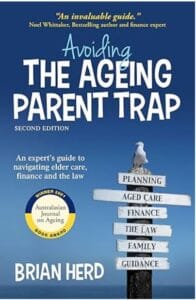Now retired, but still actively involved in family mediation, Brian Herd’s book will demonstrate many of the unintended traps encountered by children and their parents, particularly in the context of avoiding the ageing parent trap. This book serves as an essential guide for those seeking to navigate the complexities of elder law and financial planning.
This topic is crucial for families navigating the challenges of life, emphasizing the significance of avoiding the ageing parent trap.
This topic is crucial for families navigating the challenges of life, emphasizing the significance of avoiding the ageing parent trap. By understanding the potential pitfalls, families can take proactive steps to protect their loved ones and ensure financial stability.
This book should be required reading for all law students, lawyers, accountants, financial planners and advisers. It not only covers the legal aspects but also provides real-life examples that highlight the importance of proper planning. Equally important, it should be read by older adults preparing their enduring documents (wills, powers of attorney and advanced care directives) along with their families, ensuring they are all informed of the implications of their decisions.

Brian Herd has expertly utilized his extensive experience in Elder Law to compile a considerable list of examples showcasing where things have gone wrong in the preparation of essential documents for the final stages of life. Each case unveils the intricacies of law and family dynamics, emphasizing why it’s vital to consult professionals. While many of these experiences may not directly apply to your personal situation, they provide valuable insights and entertaining reading for everyone.
Understanding ‘unintended consequences’ is paramount. Families must look beyond the immediate situation to anticipate what may unfold in the future. For instance, consider the implications if one partner develops dementia and enters a care facility, possibly forming a bond with another resident, leading to unexpected issues regarding inheritance and family dynamics.
During Brian’s enlightening talk and after absorbing the book’s content, I became acutely aware of the term ‘de facto’ relationship. Many individuals mistakenly believe that they are not in a de facto relationship simply because they do not reside together. However, this might not hold true in various circumstances, which is why it’s essential to discuss these nuances with your lawyer to prevent unforeseen complications involving estate distribution.
The book shares a striking example where one individual found themselves simultaneously involved in four de facto relationships, each with equal entitlement to the deceased’s estate. This scenario illustrates the complexities of modern relationships and the importance of clear, concise legal documentation.
Over my lifetime, I have observed numerous friends facing terminal illnesses, often within blended families who have failed to create a will. If you learn nothing else from this book, and you happen to be someone who has not made the necessary provisions, please take action: read this book, consult with your lawyer, and prepare the following essential documents to safeguard your wishes and your family’s future:
- Last Will and Testament
- Enduring Power of Attorney
- Advanced Health Directive
Much of the information is relevant to those who are just commencing their investment journey. Understanding how to structure your investments strategically is vital, taking into account future capital gains and inheritance implications. This foresight aids in making informed decisions that can preserve wealth across generations.
I wholeheartedly recommend this book to everyone who wants to ensure that their inheritance is given to those whom they intended. It’s a critical resource that can spark important discussions within families, helping to foster an understanding of the implications of not taking action. Ensuring everyone is on the same page can prevent conflicts and misunderstandings down the line.
Preparing these documents can help ease the burden on your loved ones during difficult times. A Last Will and Testament outlines your wishes regarding the distribution of your assets after your passing. An Enduring Power of Attorney allows you to appoint someone to make decisions on your behalf if you become incapacitated, ensuring that your financial and legal matters are handled according to your preferences. An Advanced Health Directive enables you to express your wishes regarding medical treatment and end-of-life care, providing clarity to your family and healthcare providers.
Glenis Phillips SF Fin – Good Financial Reads. This book is an essential read for anyone concerned about their family’s future and financial legacy, making it a pivotal resource in the realm of financial planning.
As we navigate the complexities of life, it is imperative to address these important topics proactively. By doing so, we can avoid potential pitfalls associated with ageing parents, ensuring that we not only protect our loved ones but also create a legacy that reflects our true desires and intentions. In conclusion, the discussions surrounding avoiding the ageing parent trap are not merely academic; they are vital to the wellbeing of families as they face the realities of life and death.
Disclaimer: Financial Mappers does not have an Australian Services License, does not offer financial planning advice, and does not recommend financial products.







